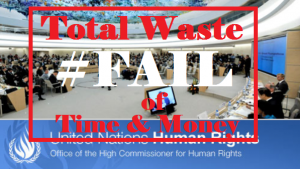
According to NGO Monitor, “The UN Human Rights Council is singling out Israel through the misuse of int’l law and the employment of double standards…The attacks on Israel prove that the entrenched political bias of the council requires immediate action.”
• NGO Monitor plans to confront UNHRC in Geneva.
By Lital Shemesh
Jerusalem-based watchdog group NGO Monitor is accusing the U.N. Human Rights Council of deception and bias for its decision to compile a “blacklist” of companies from or with ties to Israel that operate beyond the Green Line, with the aim of declaring them illegal.
At the council’s headquarters in Geneva on Monday, members of the watchdog group were set to argue the move by the UNHRC unfairly singles out Israel, while ignoring other conflict zones around the world where international companies are free to do business.
The decision to blacklist the Israeli companies, an initiative prompted by the boycott, divestment and sanctions movement, reportedly aims to bar the presence of any Israeli company beyond the Green Line. If adopted, the list could outlaw even private security firms that protect Israelis in Judea and Samaria from terrorist organizations.
According to NGO Monitor, the blacklist began as a list of all the businesses that operate in Israel, which was then narrowed down to businesses that operate in Judea and Samaria and east Jerusalem. The list includes businesses such as banks and high-tech companies that do not have a physical presence in those areas, but that nevertheless provide services to residents in the disputed areas.
“The UN Human Rights Council is singling out Israel through the misuse of international law and the employment of double standards, similarly to anti-Israel groups such as Amnesty International,” said Prof. Gerald Steinberg, president of NGO Monitor. “The attacks on Israel prove that the entrenched political bias of the council requires immediate action. There are over a dozen situations in which international corporations and companies operate in what is defined as ‘occupied territories’ without any hindrance and with no blacklists.”
NGO Monitor’s legal adviser Anne Herzberg added that “the extensive business activity in occupied territory around the world, which goes unmentioned by the U.N. and NGOs, demonstrates the utter indifference to human rights that are not tied to the U.N.’s obsessive and politicized focus on Israel.”
“International law does not prohibit businesses from operating in occupied territories, yet U.N. bureaucracy is again mobilized to deliberately target Israel,” she said. “International rules either apply to everyone or to no one.”
NGO Monitor staff will confront the UNHRC in a series of events to be held at the council’s headquarters in Geneva on Monday and Tuesday. Eugene Kontorovich, who heads the international law department of the nonpartisan think tank Kohelet Policy Forum, is also set to attend.
Kontorovitch will present findings from a new study that reveals the extensive business activity of international corporations in disputed territories such as Northern Cyprus, Western Sahara and the Crimean peninsula at an event for reporters and diplomats Monday afternoon.
View original Israel Hayom publication at:
http://www.israelhayom.com/site/newsletter_article.php?id=43227







 Israeli New Shekel Exchange Rate
Israeli New Shekel Exchange Rate